by Heather Green
There are moments in every life that are defining. We can live weeks, months, and years sometimes without having anything memorable happen, then in a flash, our lives are forever changed. These moments create memories that are seared into our brains. Psychologists call these “flashbulb memories,” and these events, when remembered come to us as if they just happened—clear, precise, with every one of the five senses engaged. They can be wonderful moments, they can be devastating moments, but one thing is certain…these are the moments that serve to shape us and pave the road we follow for the rest of our lives.
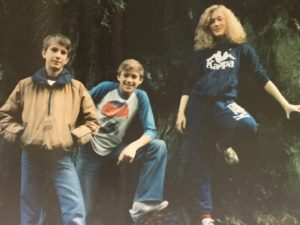
One of the first of these moments happened to me when I was twelve. I lived in western Montana with my Southern Baptist minister father and my mother who directed music in my father’s church and who gave up a career as a violinist and vocalist to marry and raise five children. I was in the middle of this line up, with two older sisters and two younger brothers. While most children balked at going to church, I loved my father’s ministry. As a person who fed off of a lively crowd, it suited me.
I especially loved it when visiting pastors and their special musical guests would come to visit our church. One of my favorites was Brother Harvey Pounds and the Bluegrass Gospel group who traveled down to the Bitterroot Valley to minister (good Christians don’t “perform,” they “minister”!) in our church a few times a year. Harvey, unlike my father who was educated in a seminary, was a self-taught preacher. While he was a passionate hell fire and brimstone kind of speaker, his wife Donna was a quiet, pensive lady. Her sweet and timid personality seemed to balance Harvey and together they were raising several children.
On the evening of April 11, 1974, my father came home later than he usually did. As I remember, it was dark when he walked through the door with a very solemn look on his face. Dad had to deal with a lot of things as a minister that were emotionally draining, but tonight something was different. I remember him stopping and looking at mom and saying the words that still ring in my ear: “Somebody murdered Donna Pounds today.” Mother gasped so loudly, sucking all the oxygen from the room. My head was spinning…my twelve-year old brain was having a hard time grasping what he’d just said. “You mean, she’s dead?” was all I could think to say. Dad nodded and of course the next question didn’t need to be asked. “They don’t know who did it. Harvey is a mess.”
After many questions from the family and many “I can’t believe this has happened!” and “God help Harvey and the kids,” I had to shake it off and finish my homework. I would be up late that night, because I had left my textbook in the car when Dad had driven to work that day. I made my way outside to retrieve it, my head just spinning. It was pitch black. I could literally hear my heart pounding in my ears as I made my way to the back of the station wagon where I knew my book was. Was this monster watching me? Was I going to be next? Does he know we know her? By then I had opened the back of the car and was reaching into to abyss trying to find my book, nearly hyperventilating at this point as I groped around feeling for that book, when the unthinkable happened…a BOOM so loud it rattled that windows of the house, and shook the car I was half inside of. My parents could hear me screaming as if I were dying and when I took a breath, I could hear laughter coming from the house. As sure as I was that I had just been shot like Donna had, I had been the victim of a very poorly placed sonic boom, courtesy of a jet overhead. This night, this highly charged night, was one of my very first flashbulb memories.
From that evening forward, I couldn’t shake the feeling I had that night. The abject horror and fear and the feeling of loss, for sure, but the overwhelming sense I was left with was curiosity. I began to question why some people couldn’t just resolve their differences and walk away. But the thing that fascinated me more than anything was, how and why would someone kill another person they didn’t even know? In the early stages of the investigation, it was clear that nobody who knew Donna had killed her. At least nobody in her immediate circle of family and friends. So who would have enough rage to do what they did to her? (It was later learned that Donna had suffered greatly at the hands of her killer.)
It was around this time that I had heard of some new developments from the FBI. I was still a child, and because of this, I wasn’t able to understand much, but I did know that the FBI was working with these kinds of criminals and getting information together so they could possibly answer some of these questions. Every chance I got, I would try to find out more. I know now that this was the beginning of the Behavioral Analysis Unit, where psychological profiling was conceived. This is around the time the term “serial killer” was born—and I was hooked.
They were using this term to describe a man in Seattle who was killing college-aged girls who had long brown hair, parted in the middle. My oldest sister had just moved to Seattle. She was a pretty girl, long brown hair, parted in the middle. Every night my mother was sure we were going to get a call saying my sister had been a victim of this “Ted” guy. Thank God it never happened, but once again, I was touched indirectly by this strange phenomenon, strangers killing innocent victims. My intrigue, by now, had taken hold and would remain deeply rooted for the rest of my days. I knew I had a calling in this field in some way. Little did I know it would take me almost 40 years to figure out what that calling looked like.
Ahead of the curve
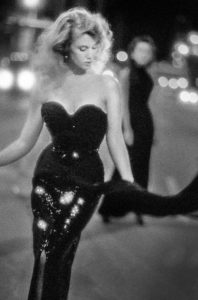
After I wound my way through middle school and high school, I fell in love with the sound of a crowd’s applause. To the great delight of my mother, I’d inherited her strong mezzo soprano voice and quickly made a live singing for my supper…as well as my clothes, rent, and everything else. Genetics was kind to me in that I inherited my father’s long legs, and in the early 1980s when I wasn’t performing musically, I was modeling for French clothing stores, ski clothing manufacturers, even sunglasses manufacturers.
As a natural ham I loved the attention, but couldn’t break away from my fascination with the criminal mind. By the 80s and 90s, true crime, and even the word “forensics” had begun to creep into the daily consciousness. I picked up every book I could find on the subject and was proud to be the resident expert on all things cringeworthy and frightening. I didn’t waste my time on the silly thrasher movies. I wanted to know about everything from the Black Dahlia to Jack the Ripper. (I had, as a younger student in school, when given the task to write a research paper about a significant historical figure, chosen him as my subject. When my teacher “encouraged” me to choose another person, I effectively argued that he had shaped the minds and lives of all who knew about him and had had a significant influence on the course of history. It was a report that was never read aloud to the class.)
As my career as a performer was winding down, I decided that it was finally time I did something about my fascination. I enrolled in a beginning psychology course in the local community college in southern California and felt like I’d take the first step in realizing my life’s purpose. On the first day of class, the professor asked us each to tell her why we were in her class. When it was my turn to share, I said, “I want to be a forensic psychologist!” My professor looked at me with a blank stare and asked, “what is that?” I was clearly ahead of the curve that was about to take the world by storm.
I loved that class, and toward the end of the course, I knew I had found my calling. The only thing I wanted more was to be a mother. Funny how things happen…it was about that time I found myself pregnant with my first child. I knew these two paths were not compatible (to me at least) and while I yearned to throw myself into everything murder and mayhem related, my maternal instincts needed to be acknowledged, and I walked away from school. I walked away from everything and over the next 24 years reveled in the role of mother. I had all but accepted that the chance for me to run with the murder chasers had eluded me, but I was blessed and happy.
The Mother of Invention
When my youngest child was 13, and entering into high school, the house was getting deafeningly quiet, and that niggly feeling started coming back. There was this crazy notion that began to float around in my head. What if…what if I started college now, I would be done with my undergraduate work when she was done with high school, which would leave me free to pursue my graduate degrees and I could actually become…A FORENSIC PSYCHOLOGIST!
Then another reality hit me. Nine years previously, after suffering from confusing symptoms and seeing literally dozens doctors, I had been diagnosed with FSHD. While I hadn’t been completely disabled yet, I had begun to be really annoyed with the beginning stages of this maddening disease. I was almost 50 years old! Was I crazy to think I could do this? As I was expressing my doubts to a friend one day, she asked me how old I would be when I was finally done with my education? I kind of groaned and told her “around 60.” Then she asked me a question that was to change my life:
“And how old will you be in ten years if you don’t go to school and realize your dream?”
“Around 60.”
Yes. I would be the same age and would be unfulfilled and angry with myself for not having gone for it.
Then I was in for another surprise. This disease that I’d grown to resent, this thing that was growling inside me was about to play an enormous role in making it possible to live this dream. I was told about vocational rehabilitation, a government subsidized program which makes money available for citizens to become trained or educated in a new field of work should they find they can no longer work in the field they were in due to some kind of physical disability—such as muscular dystrophy. Yes, FSHD was going to pay for my education. And this wouldn’t have been possible earlier in life, because my case didn’t express itself until later, and wasn’t diagnosed until I was 41.
More flashbulbs
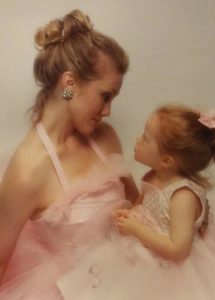
After seeing doctors for over ten years, and being told I had everything from multiple sclerosis to lupus, I had the opportunity to see some doctors who weren’t satisfied with not knowing. After a tumultuous and life-threatening pregnancy and giving birth to my beautiful daughter in 1998, my very observant obstetrician knew there was something very wrong. She sent me to an amazing neurologist in Pasadena, who narrowed my disorder down to a family of neuromuscular disorders, and sent me to UCLA to find out which one it was, which provided me with one of the most traumatic flashbulb moments of my life.
I was summoned to UCLA to get my results and was nervous but more curious. When the doctor finally came into my room with my results, I was taken aback. This wasn’t the doctor who I had seen before, but was a young, curt resident. She had little time for niceties and got right to the point. “You have facioscapulohumeral muscular dystrophy” (say what?). “It is a degenerative disorder. You will probably lose the ability to show any kind of emotion as your facial muscles will no longer work, you will most likely lose the ability to chew, swallow and blink. Most patients lose mobility, so you’ll find a wheelchair helpful, and your shoulders will fall forward, making it impossible to lift your arms higher than shoulder height. There is no treatment, no cure. Here is a brochure for the MDA, call them for answers and support groups in your area. Any questions?”
So. Many. Questions. Where was my voice? Oh. My god don’t cry, don’t cry, don’t cry!
The walls of the small examination room began to close in on me and it felt as if the world had begun to spin. I was finding it hard to breathe. I sat there all alone with images of myself sitting in stainless steel wheelchair, head hanging down into my lap, unable to walk or hold my baby, even deprived of the simple joy of sharing a smile with a stranger. I knew I had to leave that room of broken dreams and go look into the eyes of my precious little girl, and tell her that her mommy was going to soon no longer be able to hold her, sing to her, even smile at her. And what about my other three children who needed me so much? My friends and extended family…what will I become to them? It was all just too much. The dam broke and as I sat on the edge of that examination table, I began to cry. And I didn’t stop crying for a very, long, long time. I went home and made some very difficult phone calls to family and friends.
The next day was a Saturday and was to provide me with another flashbulb memory. I was out on a patio at home, still reeling from the news from the previous day. I was sitting in a porch swing, slowly swinging, in a zombie like daze, when my then-husband brought a phone out to me. “It’s Dr Spitzer. He wants to talk to you.” My neurologist was calling me at home on a Saturday? How strange. Still, I welcomed his voice and needed to drag as much information out of him as possible. But he had a different motive for calling. “Heather, I know you are stunned at the diagnosis, but just because you were handed your diagnosis yesterday doesn’t mean you got FSHD yesterday! You’ve had it since the day you were born, and you’re doing fine! You have a full life, with a business, family, friends. You have not given into this disease, and you won’t!” The very act of his putting this diagnosis into perspective meant the world to me and made an enormous impact.
I gave myself permission to cry and feel sorry for myself. I circled the date on the calendar that represented the one-month mark after my diagnosis, and really indulged in a pity party. It was somewhat grotesque, but I wanted to make sure I was able to fully explore the losses I was going to be experiencing. But on that day, the day with the big red circle around the date, I stopped crying. It was time to begin living again.
On my way
There were many changes that I have had to face since that day, major changes in my personal life, several relocations, the first day I used a wheelchair, and so on. I had to face that the interior design business I had worked so hard to establish was no longer possible as my arms and legs weakened. In a way, FSHD was making demands of me that I needed to answer. It also served to remind me that it was finally time to become the person I always knew I could be, disability or not.
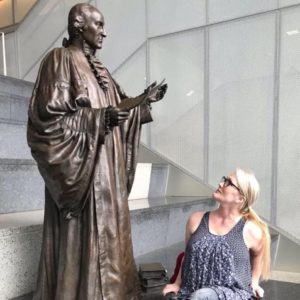
In September of 2011, I began school at the University of Montana. In 2015 I graduated with a bachelors in forensic anthropology, a minor in psychology, a certification in forensic science, and a masters level certification in forensic facial reconstruction. That fall, I’d received word that I had been accepted into the forensic psychology masters program at John Jay College of Criminology in New York City. I packed my bags and started class in January of 2016. In three years, I graduated and am now pursuing a doctorate in forensic psychology. I have worked with the FBI, researching stalking, and am currently working on several high-profile cases. I will begin work soon counseling violent offenders at the California State Prison in Corcoran, and hopefully will be able to contribute to the body of information explaining why people act in violent ways.
It has been a long road since the twelve-year-old me learned about Donna’s murder. Her killer was actually identified years later when the last of his many victims turned the tables on him and killed him. He was a furniture delivery man. He learned how to get into his victims houses when he delivered their furniture. Harvey never knew who killed his wife and died under a cloud of suspicion before the actual killer was identified. I always knew it wasn’t Harvey. He didn’t have that look in his eyes I see when I look into the eyes of killers.
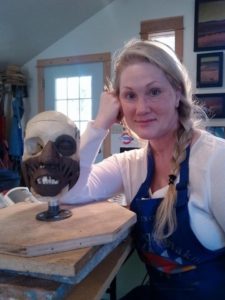
I guess I have FSHD to thank for realizing my goal. Even if it completely disables me physically, I’ll be able to continue to work, as my legs aren’t necessary for this work. It’s all brain and heart, and as anyone with FSHD will tell you, those are not affected with this condition. That is, if you don’t allow it.
I look at all these flashbulb moments and see that they were all working together to create an amazing film, frame by frame. We can’t see how one of these moments will play out later in life. We just have to trust that they will all contribute to the person we are meant to be.


I can barely breathe, having completed reading your story. I know want to go back in my head and think about my flash ball moments and how that impacted me and my journey through life. I am sure your spirit was passed on to you for your father. What a blessing. What a journey you’ve been on physically and emotionally. What comes to mind is the saying it’s not over till it’s over. We’re all on a path and just one step behind
disease and was diagnosed after the birth of her child, such as you were. She was approaching her mid 30s at that time.
Thankfully she is still alive. Hopefully you will both have many years to spend with your family and friends.
mentally
Thank you so much Jackie! Thank you for letting me share my journey with you. You’re so right about “it ain’t over till it’s over.” I feel like my life has just begun, and I’m finally doing the one thing that has kept me fascinated for a lifetime.
Blessings on you and to your family member with FSHD. It can slow us down, but by golly, it won’t stop us!!
SSDGM!
Hahahaha!! Thank you Monti!! That’s the idea!
Blessings.
Wow!! I am at a loss for words!! Your struggles both physically and emotionally certainly mirror mine. Thanks for the inspiration and telling it “like it is”.
Inspiring for the future with FSHD.
Very compelling! I applaud your courage, bravery and tenacity. I wish you well with your doctoral studies. My daughter is majoring in psychology. Do you have any advice for her?
I’m a 15-year old girl and I want to be a Forensic Psychologist too. I doubt myself a lot but you inspired me. Thank you very much. Recently I just had another flashbulb memory. The worst moment in my life. A near death experience. I thought it was a curse for remembering all of those and I tried a lot of things just to forget that. You said your flashbulb memories created an a amazing film. After reading that, I was amazed how you made that negative thing into positive. You are my role model. I hope you can inspire more people. Take care.